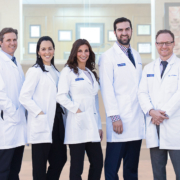Complex Dental Problems?
Why see a Prosthodontist
Dr. Eli Friedman of Friedman Dental Group with its practices being one of the leading dental groups in South Florida, and are also part of a very small minority that perform life-changing reconstructive procedures to re-habilitate its patients from years of dental neglect joins eHealth Radio and the Dental Care and Health News Channels.
Listen to interview with host Eric Michaels and guest Dr. Eli Friedman discuss the following:
What is a prosthodontist and what do they do?
What was the path you took to become a prosth-odontist (education and career background)?
What are the signs that someone should reach out to a prosthodontist and what will the prosthodontist look for in a consultation?
What benefit does seeing a prosthodontist have for a complex dental treatment?
 Dr. Eli Friedman is a recognized leader in reconstructive, esthetics and implant dentistry and is one of the few prosthodontists who places and restores dental implants. Dr. Friedman has placed and restored thousands of dental implants, including early and immediate loading. After graduating in 1998 from the prestigious Tufts University School of Dental Medicine in Boston, Massachusetts, he returned to his hometown of Toronto, Canada where he joined two of the most-renowned prosthodontic practices, focusing on cosmetic and reconstructive dentistry.
Dr. Eli Friedman is a recognized leader in reconstructive, esthetics and implant dentistry and is one of the few prosthodontists who places and restores dental implants. Dr. Friedman has placed and restored thousands of dental implants, including early and immediate loading. After graduating in 1998 from the prestigious Tufts University School of Dental Medicine in Boston, Massachusetts, he returned to his hometown of Toronto, Canada where he joined two of the most-renowned prosthodontic practices, focusing on cosmetic and reconstructive dentistry.
After six years of successful hands-on experience, Dr. Friedman completed an additional three-year post-graduate specialty certificate in prosthodontics at Nova Southeastern University’s School of Dental Medicine in Florida. His training was focused on full-mouth rehabilitation and dental implant surgery.
Dr. Friedman finished his three-year residency having placed and restored hundreds of implants, and was appointed chief resident of post-graduate prosthodontics. The combination of his six years in private practice and his three-year residency in prosthodontics made him one-of-a-kind in his field. In 2006, he lectured and presented extensively on dental implants, case presentation and was appointed teaching assignments at the University.
Dr. Eli Friedman lectures nationwide and is a fellow of the American Academy of Osseointegration, affiliated with the American Dental Association, and the American College of Prosthodontists. Having over 20 years of experience, he is regularly invited to lecture at many local and national dental organizations. Dr. Eli Friedman is married to Dr. Katia Friedman, who practices general and pediatric dentistry.
They have two daughters, Chloe and Lauren. The Friedman’s have four dental practices in South Florida—in Coral Springs, Plantation, Tamarac, and Palm Beach.

Social Media Links:
Facebook: https://www.facebook.com/DentalImplantsFlorida
Twitter: https://twitter.com/DentalFriedman




